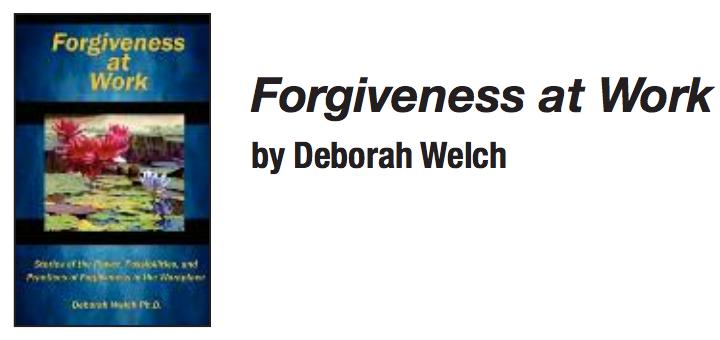
How much of our lives have we wasted due to the drain of fear, unhealthy judgment, and the emotional gridlock these cause? Deborah Welch unlocks this destructive puzzle in a powerful and inspiring new book, Forgiveness at Work: Stories of the Power, Possibilities and Practices of Forgiveness in the Workplace.
The opening story comes from an incident that took place early in my own career. A number of university students, professors, public school master teachers, parents, and others had poured seven years of our lives into creating an award-winning children’s program—a program that was closed for political reasons just as it was awarded funding for the first time. In an astounding way, the loss became a blessed gain, and the problem became an opportunity. But first I had to find the moral courage to give up my own toxic anger and fully forgive myself and those I blamed. Over the years, I have been able to draw on this transforming series of events to help others dare to seek the opportunity within their most painful problems. Clearly, this loss was a profound teacher and turning point where forgiveness was the essential key that unlocked four plus decades of unfolding blessings.
Organizational Sustainability
But what in this extraordinary book opened my mind, heart, and will in profound ways were the stories, each from a different real-life challenge. For example:
- A young architect caught in a grueling job search
- The tragic death of a beloved fiancé following an argument
- The dramatic improvement and productivity that happened at American Express by breaking the chain of hate and resentment in the workplace
- Deborah’s own challenge of fear and crippling self doubt and how she is learning to overcome it through forgiveness
In each of these incidents, individuals found the ability to work in more successful, creative, and fulfilling ways through the power of forgiveness. We all encounter many situations in the workplace that require forgiveness: a coworker’s betrayal, the loss of a needed sale or job, damaging gossip, someone throwing us under the bus. And then there are the ways that we need to forgive ourselves for our own blunders and shortcomings.
Unforgiving workplace cultures are filled with gridlock, blame, cynicism, and distrust. When we don’t forgive, we end up poisoning our spirit and diminishing our own possibilities. Sometimes we don’t even notice that we’re holding back from contributing the gifts we have to give at work. Although we often think of forgiveness as “soft,” creating an organizational culture that is forgiving requires enormous courage, integrity, and emotional maturity. The result is greater innovation and trust. These factors impact the bottom line and create organizational sustainability.
The Power of Ritual
We can all practice forgiveness more often. The idea that forgiveness means allowing ourselves to be stepped on is a myth. True forgiveness never promotes abuse, and it does not excuse poor behavior. Instead, it brings wisdom to any difficult situation and helps us hold ourselves and others accountable for achieving greater results and more authentic learning.
According to Deborah, the word “forgiveness” literally means “cancel” in the Aramaic language. How powerful and redemptive to have a painful and perhaps thoughtless word or deed literally cancelled from memory or history. Gone, erased, forgiven as though it never happened. To support us in making this happen, Deborah shares a powerful forgiveness ritual she learned from her long-time mentor Edith Stauffer.
These simple insights and transforming steps free one’s spirit and soul to identify and release inner shame and blame on the path to creative breakthroughs and inner peace. A profound takeaway for me was the realization that I can’t authentically forgive others until I first forgive myself. I find myself practicing these steps in moments of harsh judgment of self and others.
All of life is a living, organic network of connections, a system in which we are players. In Forgiveness at Work, Dr. Welch holds up a mirror and gently helps us discover how we imprison ourselves and others through judgment, fear, and blame. And then she provides the insights, skills, and tools to reverse that dynamic through forgiveness. In the process, we become creative, healthy people with the power to create a positive, abundant future filled with hope and possibility.
Ann McGee-Cooper, Ed. D., is a founding partner of Ann McGee-Cooper & Associates. She is an international leader in servant leadership in the workplace, having served on the Culture Committee of Southwest Airlines since 1990 and with TDIndustries since 1976. She is the author of You Don’t Have To Go Home From Work Exhausted and The Essentials of Servant-Leadership: Principles in Practice.
